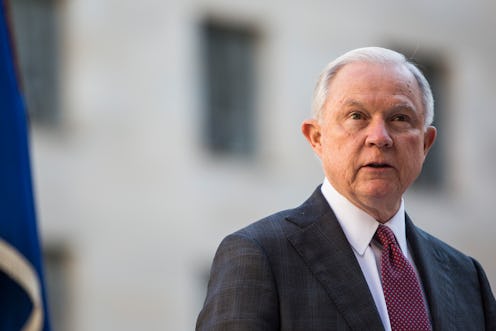News
Federal Judge Rules Jeff Sessions Can’t Withhold Money From Sanctuary Cities

On Friday, a federal judge based out of Chicago ruled that the Trump administration can't pull federal funds from sanctuary cities, the latest legal development in its ongoing efforts to punish such cities. As detailed by The Chicago Tribune, the judge in question ― U.S. District Judge Harry Leinenweber, to be specific ― ruled in a 41-page opinion that the city of Chicago has demonstrated a "likelihood of success" in its challenge to the Trump administration's efforts to yank federal funds, and as such he's granted a nationwide injunction.
The upshot of the ruling is that, for the time being at least, the administration is barred from pulling funding from so-called sanctuary cities, a label typically applied to places where local police departments do not attempt to enforce immigration law when dealing with potentially undocumented immigrants in their communities.
Such cities have been a longtime rhetorical punching bag for President Donald Trump. Throughout his presidential campaign, he vowed to pull federal funding from such cities unless they began cooperating and collaborating with Immigration and Customs Enforcement (ICE) to facilitate deportations. Several historically liberal major cities, including San Francisco and Seattle, flat-out refused to adhere to the demands, and began legal action against the administration.
There are very good reasons why many metropolitan police departments refuse to get involved in checking and enforcing people's immigration statuses, the main one being the downward pressure it exerts on the undocumented. The big concern is that if people who lack legal residency in the United States believe their local police department may detain or attempt to deport them, they'll be reluctant to come forward to law enforcement if they're aware of the commission of a crime. As such, authorities often choose to prioritize enabling undocumented victims to report crimes over taking on the work ICE typically does.
Trump, for his part, signed an executive order intending to block such cities from receiving federal funds back in January, in his very first week in office. The matter has been a subject of constant legal challenges and wrangling ever since; in April, a federal judge in San Francisco similarly ruled against the administration, as did a federal judge in Texas just last month.
Attorney General Jeff Sessions, long a vehement and far-right voice on immigration policy, has in the past condemned sanctuary cities, describing them as making "all of us less safe" as The Hill noted following Friday's ruling:
So-called sanctuary policies make all of us less safe because they intentionally undermine our laws and protect illegal aliens who have committed crimes. ... These policies also encourage illegal immigration and even human trafficking by perpetuating the lie that in certain cities, illegal aliens can live outside the law.
It remains to be seen what step the administration will take next, or whether Trump himself will speak out about the ruling. In the past, in particular amid the court battles over his executive order banning refugees and immigrants from several predominantly Muslim countries, he's taken an extremely combative and hostile tone toward the judicial branch.